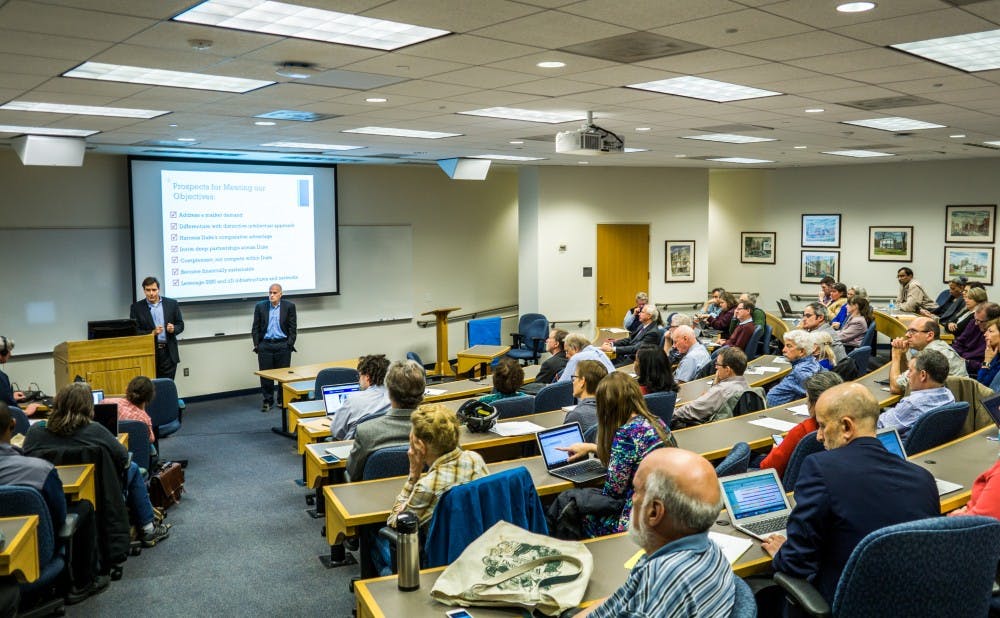During its Thursday meeting, Academic Council heard a proposal for a new master’s degree program and debated changes to the faculty handbook.
Robert Calderbank, Charles S. Sydnor professor of computer science and director of the Information Initiative at Duke, and Tom Nechyba, professor of economics and director of the Social Science Research Initiative, presented their proposal for a new master's degree in interdisciplinary data science. The degree aims to address the surge in worldwide demand for data scientists.
“We want to offer it in partnership with schools across the University,” Nechyba said.
The program was inspired by a 10-week summer program called Data+—offered through the Information Initiative—in which teams of undergraduates create data science projects, Nechyba explained. He noted that the master's program, if approved, would start with 20 students and then work its way up to 30.
The program will also emphasize strong English language skills because of its team-based nature, he said.
Members of the council will vote on the proposal at their February meeting.
Judith Kelley, Kevin D. Gorter professor of public policy, and Kevin Moore, vice dean for faculty affairs, engaged the Council in a discussion about potential changes to the faculty handbook regarding non-tenure track and regular-rank faculty.
Currently, procedures for appointing and promoting non-tenure track and regular-rank faculty are located in appendix C of the handbook, while this information for tenure-track faculty is in chapter 3. Kelley and Moore argued for consolidating procedures for all kinds of professors in chapter 3.
Only rules in the actual faculty handbook can be altered, so moving the procedures for non-tenure track and regular-rank faculty from the appendix to the handbook would allow for alterations, Kelley explained—a necessary move because the recommendations for promoting non-tenure track and regular-rank faculty have not changed since the 1990s.
This change would “better recognize the value of all faculty under the provost,” noted Nan Jokerst, J. A. Jones professor of electrical and computer engineering and chair of the Academic Council.
Moore noted that non-tenure track faculty have become much more diverse in the past two decades—spanning performers and musicians to former employees of the World Bank.
“One set of criteria for appointment and promotion can’t fit all of them,” he said.
Kelley noted that she and Moore tried to come up with a common set of rules for the updated chapter of the handbook that would still provide some flexibility for different departments to use their discretion in promoting faculty. They consulted with institute directors, met with Jokerst and Provost Sally Kornbluth and asked for feedback from schools across the University. Faculty will vote on the proposal at their February meeting.
In other business:
Kerry Haynie—associate professor of political science and African and African American studies and chair of the Academic Council nominating committee—presented two candidates for the next Academic Council chair, who will take office July 1. Ellen Davis, Amos Ragan Kearns professor of bible and practical theology, and Don Taylor, professor of public policy, were both nominated.
Jokerst will send out a survey in the coming month for members to vote. The new chair will be announced at the Council’s February meeting.
“I call it Sophie’s choice, but there are only good options in this case,” Jokerst joked.
President Richard Brodhead addressed council members’ questions about the recent reported performance of the University Endowment, which posted a 2.6 percent loss on its investments during the 2016 fiscal year.
He noted the need to look beyond a single year’s returns, explaining that the University’s strategy is to invest for long-term purposes.
Get The Chronicle straight to your inbox
Signup for our weekly newsletter. Cancel at any time.

